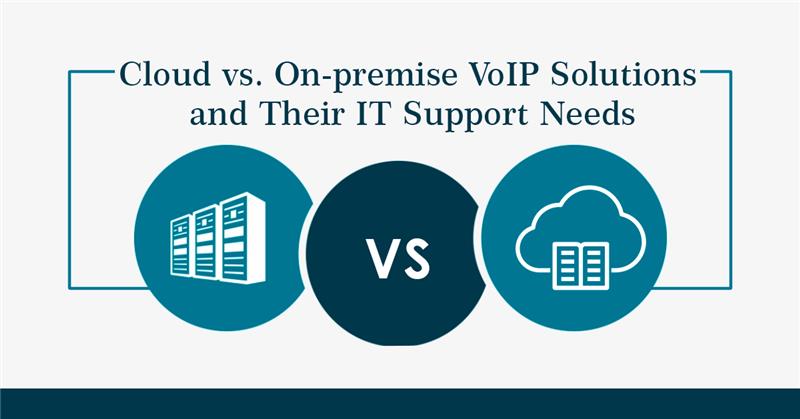
VoIP Cloud-based solutions have become so renowned and crucial that every business in Los Angeles is leveraging them to optimize its workflow. They enable organizations to use modern technologies and offer secure storage for massive data to streamline business operations.
When we talk so much about the cloud, enhancing communication through the cloud platform is one of the essential aspects businesses are leveraging upon. Thus, understanding the difference between cloud-based and on-premise VoIP services will help you make better decisions to enhance business communication.
This blog will describe the pros and cons of On-premise and hosted cloud phone systems, how they work, their benefits, and how IT Support Los Angeles companies like Fusion Factor can help you set up a reliable cloud-based phone system.
What are VoIP Services?
Voice over Internet Protocol (VoIP) is a service that allows users to conduct video calls, voice calls, and messages over the Internet. VoIP converts voice into digital signals, breaks them into packets, and sends them over the Internet. On the other hand, the packets are combined and sent as sound waves.
Businesses around California use VoIP services because they are more flexible, can be accessed from anywhere, and are more cost-effective than other phone services.
What is an On-premise phone system?
A phone-based system is physically installed in the organization. It consists of physical wires usually connected to data centers and staff desk phones. The on-premise phone system allows you to make calls through the Internet. This system can be expensive as it requires installation equipment.
What is a Hosted Cloud Phone System?
Cloud-based phone systems use cloud computing technologies to make calls through the Internet with servers hosted at remote locations. Integrating VoIP services with the cloud enables users to make calls through the cloud. It allows users to leverage call forwarding, video conferencing, and voice-to-mail features. A cloud-based phone system brings more flexibility, scalability, and cost reduction by eliminating the need for physical hardware.
Pros and Cons of On-Premises Phone System vs. Hosted Cloud Phone System
On-Premise Phone System
Pros
Reliability: This system relies on something other than the Internet or cloud for basic functionalities.
Complete Control: You have full control over the hardware and data, as they are physically fixed in the organization's premises.
Customization: It can be easily integrated into other tools per business requirements.
Cons
Costly: Organizations need to invest in hardware, setup, and infrastructure, which is an overhead cost to the business.
Low Scalability: If the organization's workload increases or the business grows, more investment is needed to scale the VoIP services.
High Maintenance: Inhouse IT support is needed to maintain, repair, update, and troubleshoot issues.
Hosted Cloud Phone System
Pros
Remote Access: It can be accessed from anywhere using internet services that promote a remote work environment.
Automatic update: In-house IT personnel do not need to look for updates. The cloud service provider will automatically update and troubleshoot issues if necessary.
Scalability: It can incorporate the growing needs of businesses as it is easily scalable.
Cost-effective: Low hardware cost follows pay as you use no upfront cost.
Cons
Minimal Control: The organization controls the hardware and backend process less.
Depends on the Internet: A robust Internet connection is needed for optimum performance.
How Do Cloud Phone Systems Work?
A cloud-based VoIP phone system relies on an Internet connection's speed, bandwidth, and minimal latency to make and receive calls. Once a strong internet connection is established, a cloud-based phone system provides the same calling experience as the on-premise ones with many added features. As cloud service providers have access to cloud systems, they can automatically maintain, update, and troubleshoot the system when required.
Fusion Factor has your back if you are a business searching for flexible, scalable, and cost-effective cloud-based VoIP services. Our IT Support Los Angeles experts can help you integrate seamlessly and quickly with multiple locations without the need for bulky hardware and expensive setups.
How To Set Up A Voip Server In The Cloud?
Choose A Provider: Look for a service provider that offers flexible and scalable cloud VoIP services like Fusion Factor. Ask them for a demo to enrich your decision.
-
Strong Bandwith:
Cloud-based VoIP services require good bandwidth to support the number of calls and provide good sound quality. If the bandwidth is low, it may get a drop or might have poor sound quality.
-
Install Hardware:
Depending on your chosen VoIP system, hardware needs to be installed, whether IP systems or ATA adapters. Also, ensure the hardware is connected to the public switch connection system.
-
Install and Configure Software:
Install VoIP software and configure it according to your business requirements, such as Voicemail, call routing, or user permissions.
-
Test the System:
Ensure your new cloud-based VoIP system is functional by making and receiving calls, sending voice messages, conducting video calls, and checking many more features available.
-
Train the Staff:
Train your staff to use the new system and address the challenges they face using a VoIP system. This ensures seamless adoption and collaboration of new technology.
What Are The Benefits Of A Cloud Phone System?
-
Cost Effective
Investment in onsite infrastructure is low as no bulky hardware is required. Most subscriptions make it more affordable for businesses of all types.
-
Low Maintenance:
As the cloud service provider handles the system, they have access to maintain, upgrade, or troubleshoot the system before any problems arise. Businesses don't have to indulge in the maintenance part.
-
Advanced Features
You get access to modern features like call routing, voicemail sent to emails, integrating with CRM tools, and getting analytics, enhancing productivity and collaboration.
-
Scalability
You can quickly scale the features up or down according to business requirements without investing more in hardware or software.
-
Remote work
Business owners and employees can make and receive calls from anywhere using the Internet, promoting a remote work environment.
-
Business Continuity
Even if there is a local power outage or hardware failure, your phone remains functional with the disaster recovery services provided by cloud-based VoIP services.
Wrap up!
Ineffective communication can hamper business performance. When technology doesn't work as you want it to, your productivity, efficiency, and security suffer. Thus, it's time to make decisions through strategic and careful planning.
Whether you are looking for a digital transformation or fine-tuning your network system, Our Network Support Los Angeles experts are always there to help you choose the right VoIP services for your business requirements. With our latest technology, Fusion Factor enables you to transition through clouds according to your business requirements.
To learn more about how our VoIP services can enhance your business communication, visit our VoIP services landing page or contact our IT experts at (855) 752-0710 for flawless IT Support.

